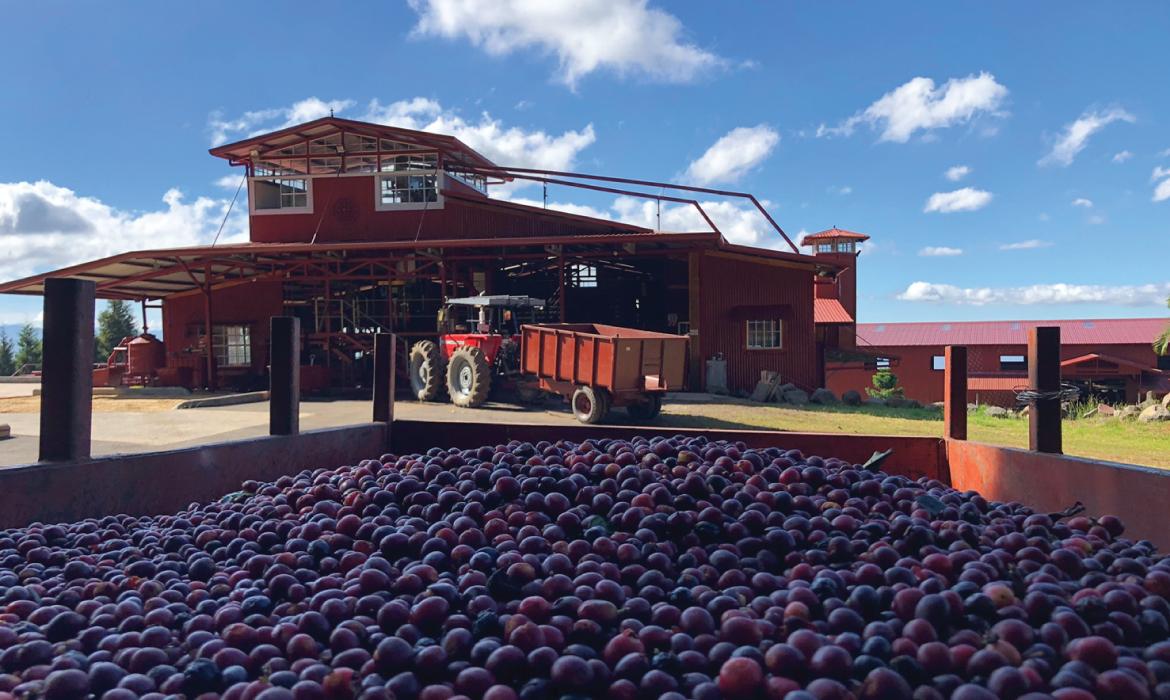

Volcan Azul - Geisha Anaerobic Natural (Extra-Light)
This coffee is from our friend and widely respected producer, Alejo Castro. Volcan Azul is a Cup of Excellence winning farm and Alejo produces some of the nicest coffee in Costa Rica. We're excited to share his coffee once again. We recommend this Geisha for fans of sweet, jammy and funky coffees. This is an extra-light variant of Alejo's geisha. We recommend extra-light profiles to experienced brewers only, willing to wait up to forty-five days after roast for best results. Extra-light profiles sacrifice initial sweetness and intensity for greater clarity.
200G - Roasted Nov. 14
Volcan Azul - Geisha Anaerobic Natural (Extra-Light)
September Coffee Roastery
119 Iber Road
Unit 9
Ottawa ON K2S 1E7
Canada
- Variety: Geisha
- Country: Costa Rica
- Region: Poás Volcano, Alajuela
- Process: Anaerobic Natural
- Altitude: 1500 MASL
- Harvest: 2024
- Producer: Alejo Castro
- Farm: Volcan Azul
- Roast Level: Extra-Light
 In the cup
In the cup
In the cup we get a strawberry chew and caramel sweetness. This extra-light has a grassy finish. We get an orange, citrus acidity and dried fig. This coffee has a light body and a long strawberry finish.
 Funky
Funky
 Experimental
Experimental
 About The Producer
About The Producer
Alejo Castro is the fifth-generation descendant of renowned coffee pioneers Alejo C. Jimenez and Wilhelm Kahle. Alejo's ancestors planted some of the first specialty coffee plantations in the early 1900s with the aim to produce the best coffee in the world. With over 200 years of family tradition in trading specialty coffee, Alejo's mission for the farm has been exclusively focused on improving coffee quality while making a positive impact on the environment. The highly fertile volcanic soil combined with the mill's impeccable processing methods has produced a history of award - winning coffees in Costa Rica.
 Processing
Processing
For this anaerobic natural-processed Geisha, the process begins with picking the cherries at their optimal stage, which are then washed at the mill and sorted to remove floaters. The beans are transported to shaded fermentation tanks located in the forest, where Alejo introduces natural yeasts cultivated on the farm. During fermentation, various factors such as temperature, pressure, pH levels, and brix (sugar content) are closely monitored. This meticulous control ensures the final pH level of the lot is 3.29, and the final brix level is 17. At Volcan Azul, patio drying and mechanical dryers are generally utilized for larger batches, while raised beds are primarily reserved for micro-lots. Notably, patio drying occurs at an elevation of 1,500 meters above sea level, where the cooler temperatures slow the process, allowing the beans' aromas to fully develop. In 2021, Volcan Azul made a substantial investment in their drying infrastructure, doubling the size of their drying patio and adding two new mechanical dryers. For this particular lot, the coffee beans were dried under the sun on patios for 12 days until they reached a humidity level of 11.7%. With regards to the natural anaerobic processing, this Geisha lot underwent a precise fermentation process of 4 days in closed tanks at a temperature of 23.9°C, achieving a final brix level of 17.
 Variety
Variety
This variety was originally collected from coffee forests in Ethiopia in the 1930s. From there, it was sent to the Lyamungu research station in Tanzania, and then brought to Centro Agronómico Tropical de Investigación y Enseñanza (CATIE) in Central America in the 1953, where it was logged as accession T2722. It was distributed throughout Panama via CATIE in the 1960s after it had been recognized for tolerance to coffee leaf rust. However, the plant's branches were brittle and not favored by farmers so it was not widely planted. The coffee came to prominence in 2005 when the Peterson family of Boquete, Panama, entered it into the "Best of Panama" competition and auction. It received exceptionally high marks and broke the then-record for green coffee auction prices, selling for over $20/pound.There is significant confusion about Geisha because there are multiple genetically distinct plant types that have been referred to as Geisha, many of which share similar geographic origins in Ethiopia. Recent genetic diversity analyses conducted by World Coffee Research confirm that Panamanian Geisha descendent from T2722 is distinct and uniform. It is associated with extremely high cup quality when the plants are managed well at high altitude, and is known for its delicate floral, jasmine, and peach-like aromas.
